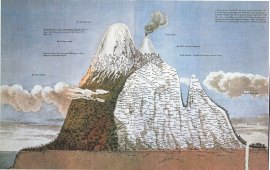
Alexander von Humboldt by Friedrich Georg Weitsch (1806)
It’s hard for 21st century audiences to understand the fame and admiration that followed Humboldt after his 1799 expedition to South and Central America. In the early 1800s, he was the most famous explorer in the world. While his fame would be eclipsed by other explorers, especially in the Anglo-American world, Humboldt is working his way back into the conversation. Patrick Anthony discusses Humboldt and his complicated legacy.

“Geographie des Plantes Equinoxiales.” Tableau Physique des Andes et Pays Voisins (1805)
Anthony is a PhD candidate at Vanderbilt University. His essay “Mining as the Working World of Alexander von Humbolt’s Plant Geography and Vertical Cartography” recently won the Nathan Reingold Prize from the History of Science Society. It is published in the spring issue of the society’s journal, Isis.

Patrick Anthony
Links:
Susan Faye Cannon, Science in Culture: The Early Victorian Period
Mary Louise Pratt, Imperial Eyes: Travel Writing and Transculturation
Michael Robinson, “Why We Need a New History of Exploration”
Aaron Sachs, The Humboldt Current: A European Explorer and His American Disciples
Laura Dassow Walls, Passage to Cosmos: Alexander von Humboldt and the Shaping of America












Leave a comment